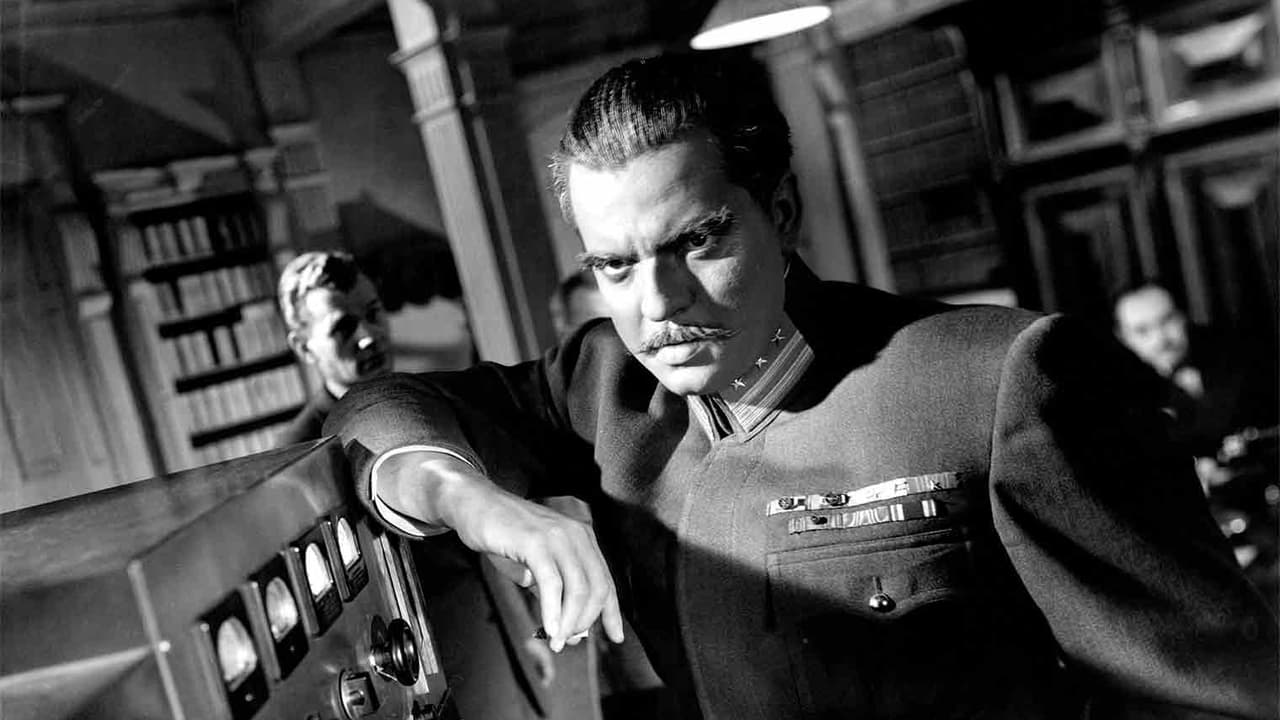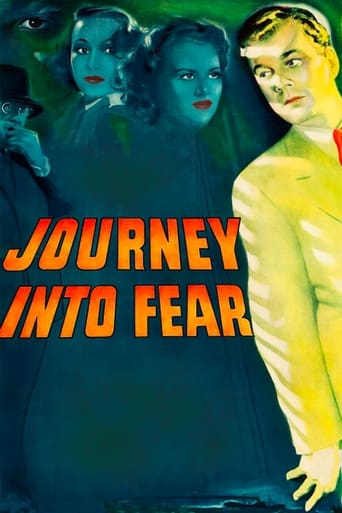



Most undeservingly overhyped movie of all time??
The biggest problem with this movie is it’s a little better than you think it might be, which somehow makes it worse. As in, it takes itself a bit too seriously, which makes most of the movie feel kind of dull.
View MoreEasily the biggest piece of Right wing non sense propaganda I ever saw.
View MoreThere are moments that feel comical, some horrific, and some downright inspiring but the tonal shifts hardly matter as the end results come to a film that's perfect for this time.
View More"Journey into Fear" is only a minor film from the likes of Orson Welles and Joseph Cotton. The idea is pretty good but the final results are disappointing. I expected something of interest to have occurred by about the opening 10 minutes. In my opinion, this didn't happen and I had to settle for what is just a routine film. The running time is only that of about 68 minutes but it seemed a lot longer somehow. The pace is rather leaden and the continuity confusing. Most of the film takes place on the sets that represent the large boat where leading man Joseph Cotton finds himself and wondering about the dangers he faces. Cotton gives a good performance and manages to overcome the shortcomings of "Journey into Fear" to a certain extent. Orson Welles makes a brief appearance as some foreign general but should have been in the film more. There are some moments of tension, it is true. If only Welles had been directing this, then the film would have been better.
View MoreThe plot to "Journey Into Fear" is not a complicated one...but it seems to make the most of it. When the story begins, Howard Graham (Joseph Cotten) is in Istanbul on business and anticipates leaving the country in the morning. However, a simple night out with a man who also works for Graham's company turns into a murder...and the intended victim appears to have been Graham but as luck has it he was spared. But the local secret police chief (Orson Welles) insists that to protect Graham he'll send him out of the country by slow boat instead of the train in order to avoid Nazi agents. Unfortunately, the Nazi agents anticipated this and soon Graham finds himself aboard a boat filled with murderers. Can he possibly survive?The story is rather simple but with a rousing ending and nice camera work it makes the absolute most of what it's got. Well worth seeing and a nice example of simplicity making for a nice picture.
View MoreOrson Welles and Joseph Cotton made several great films together through the 40s/50s one of which is the overlooked Journey Into Fear. It is a kind of surreal, absurdist thriller about war, identity and the stripping away of identity that turns a cowardly man in denial into a soldier...of sorts. Howard Graham very deliberately goes to Turkey with his wife so he can be tied to an X by a magician and have an attempt made on his life, which kills the magician and sends him into hiding on a boat on its way to the mainland. All the while he maintains the disguise of being the victim and of not wanting to get involved and of being just a businessman with no part in the war, despite being a representative of a munitions company. His wife is sent to take the train while he must be separated from her and sent adrift on the boat. This tale is very cleverly disguised in a World War 2 story but still works on both levels. Everyone knows what Graham denies himself. The Colonel who sends him away on the boat can see right through him and knowingly comments on his choice to arm himself. I find these moments funny, such as Graham clearly immersing himself in the role in private with his revolver in his cabin, clearly relishing the freedom. Everyone on the boat can see right through him, and they all appear to be stuck in their own reverie or loop, otherwise in the case of the Captain they just laugh at him as he impotently whines that there's a man on the boat trying to kill him and mock his false pleas. In one brilliant scene a tobacco salesman explains how he was scolded by his wife for making remarks and talking nonsense as if he were a mere worker, which he is at heart, then says he gained freedom at home by threatening to do so again. Like Graham, he overstepped his bounds and by doing so overcame his fear and now lives comfortably in illusion. I could go into it further, but this film is not so overt in the way it expresses its ideas so it would take longer, whereas a different kind of film like say, Metropolis, makes it very easy as the images speak for themselves, but that is a different film from a different era and being a genre film Journey Into Fear must be disguised in order to sell itself. In another scene another liberated soul gazes out to the sky and asks "what is better, to see the land from a ship, or a ship from the land?," and comes to the conclusion that he dislikes both and so takes simple comfort merely from the respiratory system that keeps him alive, another experienced man who has been liberated through time and lives a glad life dreaming aboard the boat. While they all talk of the war and its folly and how terrible it is (really the inner war of Mr. Graham), one man, a businessman, gets up and says that "war is bad for business," and it is as it seems to contradict the flow of events and cause the individual confusion. Mr. Graham, in the letter he is writing through the film from its end, apologizes to his wife for hooking up with a dancing girl on the boat he met in a club at the start of the film. She tags along with him but he just uses her as a comfort as he faces his fear of death and of his own doubt. Finally he is confronted by the man who has hired the assassin to kill him in his cabin, who has his gun aimed at him and bluntly tells him that he lucky because he is going to catch Typhus. Rightfully confused by this statement and by Muller's half assed plan he seeks to finally do something about it and when they get off the ship and he is held in a car, he disables the driver and crashes the car before reuniting with the dancer girl and his wife at a hotel, where the Colonel is also waiting. In the final showdown, on a precarious ledge high up in the pouring rain, he is finally forced into action when the Colonel, his uniformed "Turkish" protector is shot and falls back through the glass into one of the rooms, and he finally accepts his role and kills his would-be assassin. There are two different versions of the film, one with a great ending, one with a not-so-good ending. One version has his wife call up to him that he'll "catch his death of cold," and then it just ends, and the better version has him finish the letter he's been recounting the events of the film in only to scrap his version and walk through the doors to his newfound courage and freedom. Thankfully the bad ending is just on the TV version.
View MoreWhile in Turkey with his wife, Navy engineer Howard Graham (Joseph Cotten) finds himself pursued by Nazi agents out to kill him for reasons that aren't so clear to him (or us). Colonel Haki (Orson Welles) of the Turkish secret police puts him on a steamship to get him out of the country safely. On board he meets an assortment of colorful characters before realizing the assassins have followed him onto the ship.This is one of those movies Welles acted in that has so many of his directorial touches, yet another person is credited as director. In this case, Welles' friend Norman Foster. There are conflicting reports on who actually directed the film, including different statements from Welles himself. What we know for sure is that Foster directed at least some, if not most or even all, of the picture. Welles was set to direct but had to back out. He did co-write the screenplay and his notes for when he was going to direct were likely still used by Foster. This looks nothing like Foster's other films yet it does have that Welles feeling so, whatever the truth about who stood behind the camera, I think it's safe to say creatively the movie is more Welles than anybody.A blend of film noir and a WW2 espionage tale, the story doesn't always make a lot of sense but it's such a good-looking movie that it kept my interest throughout. It's also a short movie; about the same length as the average B picture of the time. The cast backing up the always-good Cotten and Welles features some entertaining Mercury Theatre regulars like Agnes Moorehead and Everett Sloane. Dolores del Rio is fine, as well. It's got a nice atmosphere and a reasonable amount of tension. As I said, it certainly looks great. In many ways, this feels like a Hitchcock imitator. But don't expect that kind of pacing or tight storytelling. It has suspenseful moments but the confusing plot brings the momentum to a halt at times. Welles fans will probably enjoy it more than most.
View More